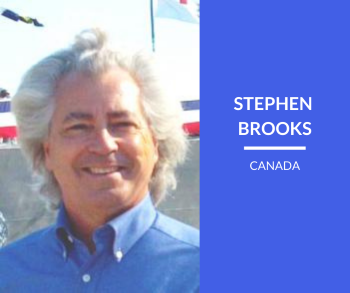EUVP visit story - Stephen Brooks
 Are you considering applying for the EUVP visit? Ever wondered how the EUVP programmes are organised and what their outcomes are? Follow the “EUVP visit stories”, featuring unique reports and testimonials from those who have joined us at the heart of the EU! Today, we present you the article written by Dr Stephen Brooks, a Professor at the Department of Political Science of the University of Windsor in Canada, who participated in the EUVP programme in 1996.
Are you considering applying for the EUVP visit? Ever wondered how the EUVP programmes are organised and what their outcomes are? Follow the “EUVP visit stories”, featuring unique reports and testimonials from those who have joined us at the heart of the EU! Today, we present you the article written by Dr Stephen Brooks, a Professor at the Department of Political Science of the University of Windsor in Canada, who participated in the EUVP programme in 1996.
Reflections on my EUVP Experience
Serendipity plays such an important role in our lives. As I look back on my personal European Union Visitors Program experience in the late spring of 1996, and how that visit has affected my professional life and the lives of hundreds of my students, I realize the essential truth of this.
I had long been interested in language politics, natural enough in the case of a Canadian, citizen of a country with both English and French as official languages. I wanted to know more about the dynamics of language in the evolving project of the European Union. I was also doing research on health policy at the time, and so this interest was also woven into my EUVP itinerary.
I visited Belgium, France and Germany during my time as an EU visitor. I already knew Belgium and France quite well, although Germany much less so. It was not getting to know these places better that made the greatest impression on me, but rather the people I met during the many meetings over the course of my two week stay. Without exception, these individuals were interested in helping me to better understand how things worked in the EU and in their own Member States. And they were also interested in knowing about Canada, and in particular about matters relating to multiculturalism, immigration policy and language in my country.
One encounter that I recall vividly took place in an office outside of the main EU quarter in Brussels, in what I can only describe as a rather unprepossessing neighborhood. It was the office of the European Bureau of Lesser Used Languages, an NGO that was closed in 2010. In my naïveté I assumed that their goal would be the protection and promotion of such languages as Welsh, Romansch and possibly even language communities as large as the Dutch. I was wrong! I received a very interesting and earnest lesson on the plight of various dialect communities in northern Italy, some of which, if I recall correctly, had no more than a couple of hundred speakers. This was 25 years ago and I've wondered over the years what has become of those communities.
For personal and professional reasons I continued to visit Belgium at least once per year after my EUVP experience. The conversations that I had during my stay and the insights that I gleaned from them, sometimes only years later, found their way into my teaching and writing during these years.
It was not until 2009, however, that I took a step that, in retrospect, had probably been gestating for many years. I created a European Union Study Abroad Program based at the University of Windsor in Canada. We partnered with the University of Michigan for several years and more recently with Western University in London, Ontario. Until the Covid pandemic caused the temporary suspension of our program, about 220 students participated in this annual two-week experience. They have been mainly from Canada and the United States, but also from China, India, Brazil, Nigeria, South Korea and several other countries. We visit all of the main institutions of the EU, several country missions and permanent representations, NATO headquarters in Brussels, a handful of NGOs, a couple of think tanks, with many cultural activities added to the mix. While in Belgium our group stays at the Irish College in Leuven. Established over 400 years ago, the Irish College adds immeasurably to my students' cultural experience in the EU.
This EU study abroad program is, quite simply, the most gratifying thing that I have been associated with in my university career. I regularly hear from alumni of the program that it was "life-changing." Many of those who participated in the program subsequently decided to study in an EU Member State. Some found internship opportunities in Europe. How many of them have made life and career choices that have been influenced by their experience in this program, I can't say for sure. I am certain, however, that all of these students were immensely enriched by their time shuttling between meetings in Brussels, learning to navigate the city's metro system, and being immersed in EU politics and governance for a couple of weeks of their lives.
I very much doubt that I would have created this program, or that my students would have had this priceless opportunity, had it not been for my participation in the European Union Visitors Program. Thank you.
Stephen Brooks
EUVP Alumnus, 1996
